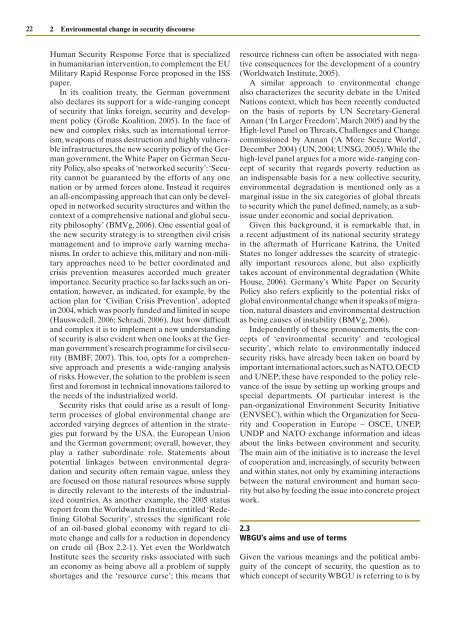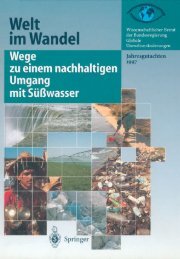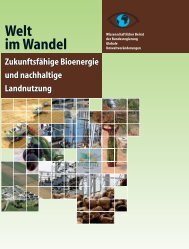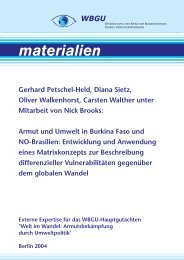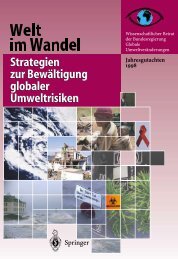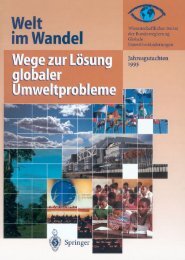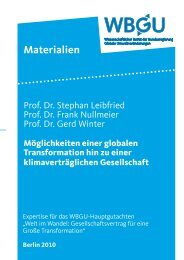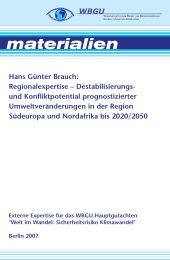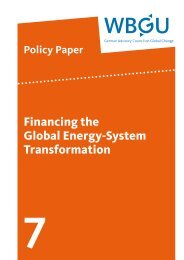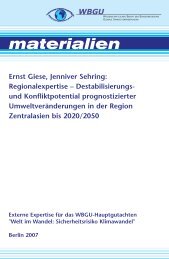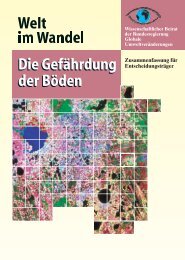World in Transition: Climate Change as a Security Risk - WBGU
World in Transition: Climate Change as a Security Risk - WBGU
World in Transition: Climate Change as a Security Risk - WBGU
Create successful ePaper yourself
Turn your PDF publications into a flip-book with our unique Google optimized e-Paper software.
22 2 Environmental change <strong>in</strong> security discourse<br />
Human <strong>Security</strong> Response Force that is specialized<br />
<strong>in</strong> humanitarian <strong>in</strong>tervention, to complement the EU<br />
Military Rapid Response Force proposed <strong>in</strong> the ISS<br />
paper.<br />
In its coalition treaty, the German government<br />
also declares its support for a wide-rang<strong>in</strong>g concept<br />
of security that l<strong>in</strong>ks foreign, security and development<br />
policy (Große Koalition, 2005). In the face of<br />
new and complex risks, such <strong>as</strong> <strong>in</strong>ternational terrorism,<br />
weapons of m<strong>as</strong>s destruction and highly vulnerable<br />
<strong>in</strong>fr<strong>as</strong>tructures, the new security policy of the German<br />
government, the White Paper on German <strong>Security</strong><br />
Policy, also speaks of ‘networked security’: ‘<strong>Security</strong><br />
cannot be guaranteed by the efforts of any one<br />
nation or by armed forces alone. Instead it requires<br />
an all-encomp<strong>as</strong>s<strong>in</strong>g approach that can only be developed<br />
<strong>in</strong> networked security structures and with<strong>in</strong> the<br />
context of a comprehensive national and global security<br />
philosophy’ (BMVg, 2006). One essential goal of<br />
the new security strategy is to strengthen civil crisis<br />
management and to improve early warn<strong>in</strong>g mechanisms.<br />
In order to achieve this, military and non-military<br />
approaches need to be better coord<strong>in</strong>ated and<br />
crisis prevention me<strong>as</strong>ures accorded much greater<br />
importance. <strong>Security</strong> practice so far lacks such an orientation,<br />
however, <strong>as</strong> <strong>in</strong>dicated, for example, by the<br />
action plan for ‘Civilian Crisis Prevention’, adopted<br />
<strong>in</strong> 2004, which w<strong>as</strong> poorly funded and limited <strong>in</strong> scope<br />
(Hauswedell, 2006; Schradi, 2006). Just how difficult<br />
and complex it is to implement a new understand<strong>in</strong>g<br />
of security is also evident when one looks at the German<br />
government’s research programme for civil security<br />
(BMBF, 2007). This, too, opts for a comprehensive<br />
approach and presents a wide-rang<strong>in</strong>g analysis<br />
of risks. However, the solution to the problem is seen<br />
first and foremost <strong>in</strong> technical <strong>in</strong>novations tailored to<br />
the needs of the <strong>in</strong>dustrialized world.<br />
<strong>Security</strong> risks that could arise <strong>as</strong> a result of longterm<br />
processes of global environmental change are<br />
accorded vary<strong>in</strong>g degrees of attention <strong>in</strong> the strategies<br />
put forward by the USA, the European Union<br />
and the German government; overall, however, they<br />
play a rather subord<strong>in</strong>ate role. Statements about<br />
potential l<strong>in</strong>kages between environmental degradation<br />
and security often rema<strong>in</strong> vague, unless they<br />
are focused on those natural resources whose supply<br />
is directly relevant to the <strong>in</strong>terests of the <strong>in</strong>dustrialized<br />
countries. As another example, the 2005 status<br />
report from the <strong>World</strong>watch Institute, entitled ‘Redef<strong>in</strong><strong>in</strong>g<br />
Global <strong>Security</strong>’, stresses the significant role<br />
of an oil-b<strong>as</strong>ed global economy with regard to climate<br />
change and calls for a reduction <strong>in</strong> dependency<br />
on crude oil (Box 2.2-1). Yet even the <strong>World</strong>watch<br />
Institute sees the security risks <strong>as</strong>sociated with such<br />
an economy <strong>as</strong> be<strong>in</strong>g above all a problem of supply<br />
shortages and the ‘resource curse’; this means that<br />
resource richness can often be <strong>as</strong>sociated with negative<br />
consequences for the development of a country<br />
(<strong>World</strong>watch Institute, 2005).<br />
A similar approach to environmental change<br />
also characterizes the security debate <strong>in</strong> the United<br />
Nations context, which h<strong>as</strong> been recently conducted<br />
on the b<strong>as</strong>is of reports by UN Secretary-General<br />
Annan (‘In Larger Freedom’, March 2005) and by the<br />
High-level Panel on Threats, Challenges and <strong>Change</strong><br />
commissioned by Annan (‘A More Secure <strong>World</strong>’,<br />
December 2004) (UN, 2004; UNSG, 2005). While the<br />
high-level panel argues for a more wide-rang<strong>in</strong>g concept<br />
of security that regards poverty reduction <strong>as</strong><br />
an <strong>in</strong>dispensable b<strong>as</strong>is for a new collective security,<br />
environmental degradation is mentioned only <strong>as</strong> a<br />
marg<strong>in</strong>al issue <strong>in</strong> the six categories of global threats<br />
to security which the panel def<strong>in</strong>ed, namely, <strong>as</strong> a subissue<br />
under economic and social deprivation.<br />
Given this background, it is remarkable that, <strong>in</strong><br />
a recent adjustment of its national security strategy<br />
<strong>in</strong> the aftermath of Hurricane Katr<strong>in</strong>a, the United<br />
States no longer addresses the scarcity of strategically<br />
important resources alone, but also explicitly<br />
takes account of environmental degradation (White<br />
House, 2006). Germany’s White Paper on <strong>Security</strong><br />
Policy also refers explicitly to the potential risks of<br />
global environmental change when it speaks of migration,<br />
natural dis<strong>as</strong>ters and environmental destruction<br />
<strong>as</strong> be<strong>in</strong>g causes of <strong>in</strong>stability (BMVg, 2006).<br />
Independently of these pronouncements, the concepts<br />
of ‘environmental security’ and ‘ecological<br />
security’, which relate to environmentally <strong>in</strong>duced<br />
security risks, have already been taken on board by<br />
important <strong>in</strong>ternational actors, such <strong>as</strong> NATO, OECD<br />
and UNEP; these have responded to the policy relevance<br />
of the issue by sett<strong>in</strong>g up work<strong>in</strong>g groups and<br />
special departments. Of particular <strong>in</strong>terest is the<br />
pan-organizational Environment <strong>Security</strong> Initiative<br />
(ENVSEC), with<strong>in</strong> which the Organization for <strong>Security</strong><br />
and Cooperation <strong>in</strong> Europe – OSCE, UNEP,<br />
UNDP and NATO exchange <strong>in</strong>formation and ide<strong>as</strong><br />
about the l<strong>in</strong>ks between environment and security.<br />
The ma<strong>in</strong> aim of the <strong>in</strong>itiative is to <strong>in</strong>cre<strong>as</strong>e the level<br />
of cooperation and, <strong>in</strong>cre<strong>as</strong><strong>in</strong>gly, of security between<br />
and with<strong>in</strong> states, not only by exam<strong>in</strong><strong>in</strong>g <strong>in</strong>teractions<br />
between the natural environment and human security<br />
but also by feed<strong>in</strong>g the issue <strong>in</strong>to concrete project<br />
work.<br />
2.3<br />
<strong>WBGU</strong>’s aims and use of terms<br />
Given the various mean<strong>in</strong>gs and the political ambiguity<br />
of the concept of security, the question <strong>as</strong> to<br />
which concept of security <strong>WBGU</strong> is referr<strong>in</strong>g to is by


